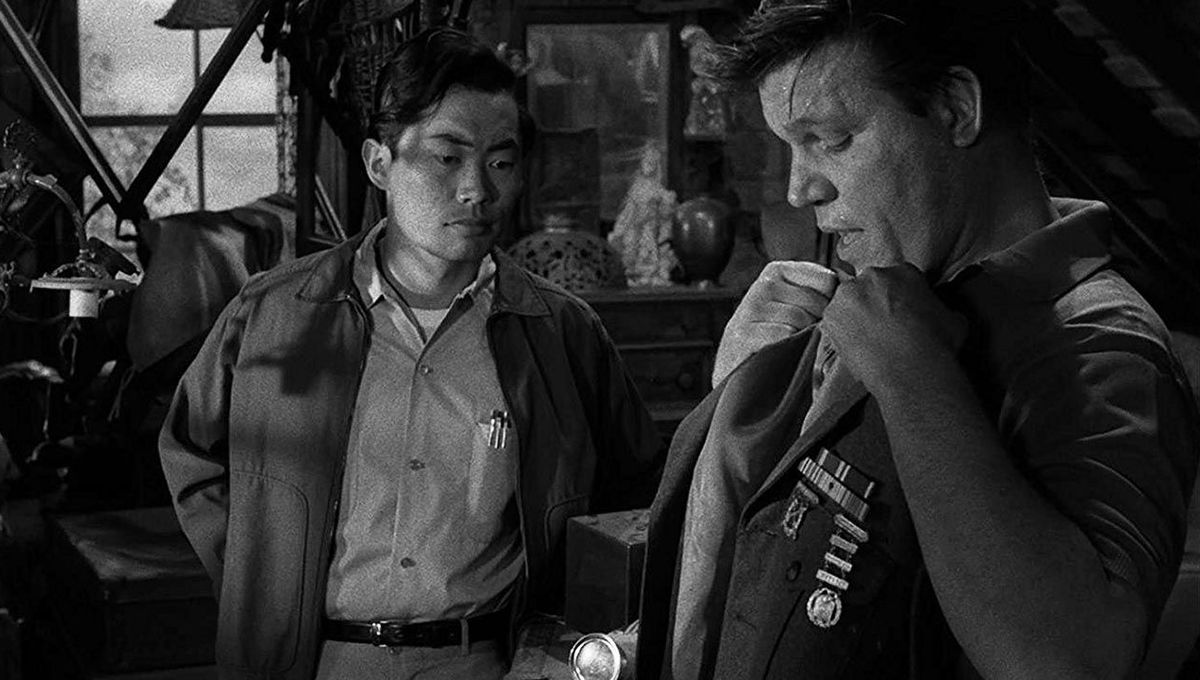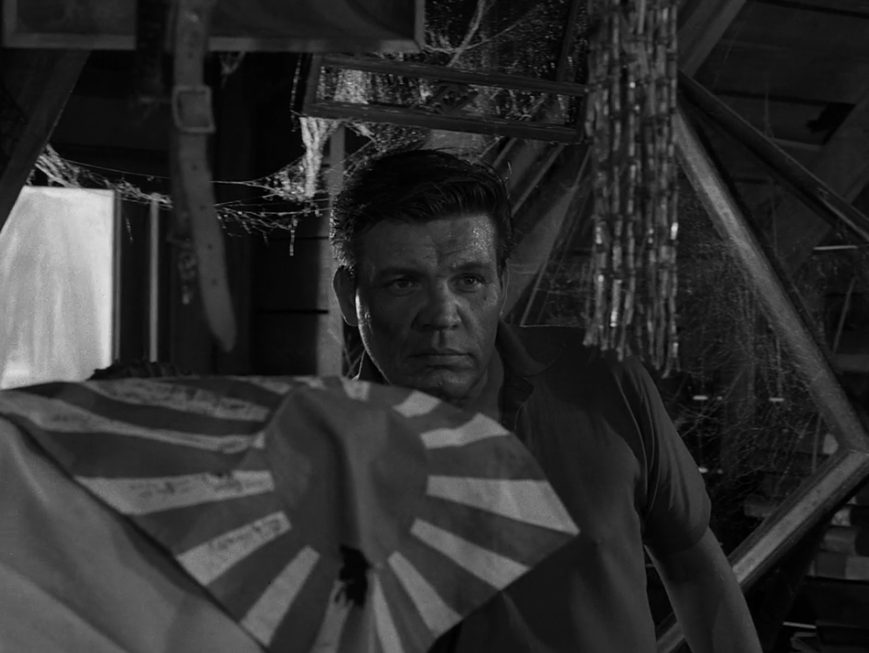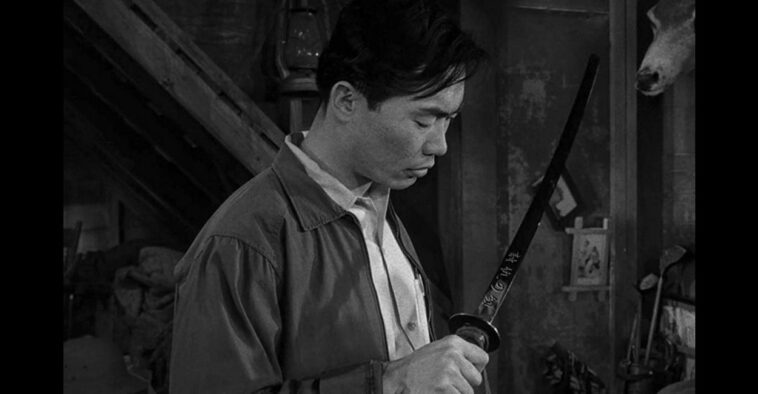Two men alone in an attic, a young Japanese-American and a seasoned veteran of yesterday’s war. It’s twenty-odd years since Pearl Harbor, but two ancient opponents are moving into position for a battle in an attic crammed with skeletons, souvenirs, mementos, old uniforms, and rusted medals. Ghosts from the dim regions of the past, that will lead us into the Twilight Zone.
Thus begins one of the most powerful and controversial episodes in The Twilight Zone’s history. Defined by Vulture as “the last great episode” of the legendary show on their top 50 list (it ranked 38th), “The Encounter” was a nearly forgotten entry in the show’s legendary canon. The 151st episode overall initially wasn’t released into syndication due to its intensity and has only been widespread on marathons as late as 2016 (per Wikipedia, grain of salt).
The Twilight Zone usually had a foot in the fantasy pool, exaggerating reality to make a point about our culture. “The Encounter” does the exact opposite, morphing the exaggeration into mere suggestion, with reality taking the lead. It allows said suggestion to inform real life without mitigating reality’s power. Even in the strongest episodes of the show, the heightened reality allowed for more thought-provoking “what-if” scenarios with things that frankly could not be. There really is never something on the wing of the plane.

But “The Encounter” dabbles in situations, supernatural or not, that go on every day. It is hard to imagine, but the concept of race relations in 1940s–1960s America and 2020 America are eerily similar. The United States is a place where ideology dictates perception, and perception is nearsighted and far too black and white. Being the melting pot it is, the US is home to neighbors who become each other’s enemies, even when there are stark differences between the monster we see in our heads and reality.
“The Encounter” makes this idea come alive by locking an American WWII veteran named Fenton (Neville Brand) and a Japanese-American named Arthur Takamori (George Takei) together in an attic. The attic belongs to the vet and in it are lots of artifacts and souvenirs from WWII, including a Japanese flag and a real samurai sword Fenton took off a dead Japanese soldier he had killed in combat. Engraved on the sword, in Japanese, is the phrase “The Sword Will Avenge Me.”
Fenton is a shell of the man he used to be: sweaty, overweight, and full of drink. His wife has just left him, perhaps for good, and he has just been laid off. All he has now is his past, and it is full of unseen horror that only Arthur brings back up to the surface. Arthur has come to the home to discuss a landscaping job that Fenton is happy to hire him for. When he invites Arthur up for a beer, the young Japanese-American hesitantly accepts.
Fenton is quick to defend his honor in that he doesn’t hate the Japanese despite the war. Arthur is quick to note that he is not a bad person but an American citizen, as if the latter immediately cancels out the former. Both men’s anxious nature belies bitter secrets laying under the surface. As the two engage in a tense drink, the truth begins to come out, and twenty years after WWII, blood may be spilled again.

A common misconception of war is thinking you are right (an inhumane act made moral). War’s basic ideology is: “believe in what I believe in or die.” Morality gets foggier when the victors get to write the history books. “The Encounter” brings up the weight of both victory and defeat. Arthur has to reassure Fenton that he is not a traitor to America just because he’s Japanese. Of course, the first twist of the episode is that Arthur’s father was actually a traitor and helped the Japanese bomb Pearl Harbor.
At first, it seems that Arthur is simply protecting his status as an American. But his scars are much deeper, and the loyalty he demands wasn’t even followed by the ones he loved. He doesn’t necessarily want to prove he’s loyal simply because he’s Japanese, but because his own father betrayed an entire nation. The weight of guilt is heavy on his shoulders, but not as initially portrayed and expected.
Of course, Fenton has his own inner demons as well. Throughout his encounter with Arthur, he reassures him that he isn’t racist and that he holds no grudges against him for the war. The big twist in his story is that the Japanese soldier he killed had actually surrendered and Fenton killed him in cold blood, adding insult to injury by stealing his sword. Fenton’s concerns aren’t out of racial harmony but because the guilt of murder hangs on him. His reassurances aren’t to absolve him of racism but of guilt for what was, at the time, a racially charged crime.
This look at the subtle masks we put on as humans is “The Encounter’s” biggest display of strength and why it doesn’t necessarily feel like a typical episode of the show. The twists and turns are in the straight drama and character reveals, not the plot or environment. There is no rug pulled out from under you in the typical fashion: this isn’t an alien world, there isn’t a supernatural force at play, and there is no puppeteer masquerading as God. This is pure humanity, in all its subtle, confusing, maddening detail.

At the time the episode aired in 1964, PTSD (Post Traumatic Stress Disorder) was not an official diagnosis, nor was it even considered a possibility in the medical community, but in hindsight, “The Encounter” seems to address the condition, showing the negatives without necessarily demonizing each individual. The episode showed the right amount of compassion for men suffering from extreme circumstances outside of their full control. Being human is making decisions and dealing with the consequences. Sometimes people get away with bad things and they have to live with them. Until they don’t.
As the closing narration states:
Two men in an attic, locked in mortal embrace. Their common bond, and their common enemy: guilt. A disease all too prevalent amongst men both in and out of The Twilight Zone.
Arthur and Fenton end up in a physical struggle when the burdens of their guilt reach the boiling point. Fenton is killed by the same sword he stole and, in sorrow, Arthur commits suicide by jumping out of the window screaming “Banzai.” Both died the way they feared: Fenton by murder and Arthur by betraying his country, screaming his ancestral country’s battle cry before dying. What started as a meeting of different, but non-judgmental, minds led to death. An analogy we in these troubled times can relate to all too much.


Definitely not a feel-good or popcorn episode. Nor is it a fun scare, it hits too close to reality for that. One of the controversies was that Arthur “confesses” that his father betrayed America to the Japanese when, in reality, there is no record or evidence of any Japanese-Americans being disloyal to the U.S. Indeed, many fought fr America against their ancestral land.